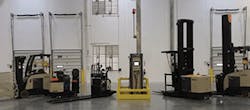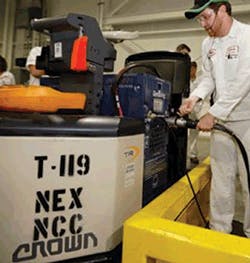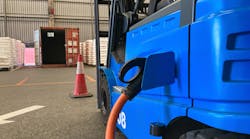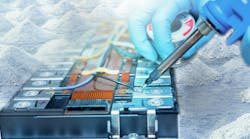A growing list of companies—both large corporations and small businesses—are adopting fuel cells not only because they make environmental sense, but a strong economic case as well.
An impressive vanguard of Fortune Top 50 companies are reaping the benefits of fuel cell-powered material handling equipment (MHE), including Walmart, CVS Health, Kroger, Procter & Gamble, Home Depot and Lowe's. These companies are also helping to expand the fuel cell footprint across North America, with more than 10,000 fuel cell-powered vehicles deployed in warehouses, freezer facilities and distribution centers in more than 20 U.S. states and Canada.
Fuel cells generate electricity from hydrogen using an electrochemical reaction, not combustion, so there are no polluting emissions, only water and heat as by-products. Fuel cells provide an opportunity to reduce impact on the environment; however, no matter how clean a technology is, businesses must consider the bottom-line and overall return on investment. Experience shows fuel cell MHE customers can save money on fuel and labor costs, lower emissions, and obtain substantial energy savings through increased efficiency and reliability.
Expanding Accessibility
Plug Power, one of the leading developers of fuel cell technology for the MHE market, provides fuel cell systems—and in some cases fueling and maintenance support—for numerous users. The company recently expanded its services to offer hydrogen fueling capability that can be scaled to a customer's fleet size and needs, providing a business case for customers with medium (50-99) or small (20-49) fleets.
Fuel cells are also generating attention and funding from companies with vested interests in the MHE market sector. In December 2014 Hyster-Yale Materials Handling acquired fuel cell manufacturer Nuvera Fuel Cells. Hyster-Yale is investing significantly in commercializing Nuvera's fuel cell technology, focusing on integrating this technology into its Hyster and Yale lift truck product lines. Nuvera also offers an onsite hydrogen generation system for fueling vehicles.
Another fuel cell manufacturer, Hydrogenics, recently received $2 million in orders from a U.S.-based developer to integrate its technology into forklifts for a big box retailer.
Concurrently, the number of fuel cell MHE users has grown rapidly over the past year.
Businesses Go to Bat for Fuel Cells
One of the heavy-hitters in this market sector, retail giant Walmart, now boasts more than 7,000 fuel cell-powered material handling vehicles at 11 sites across the U.S. and Canada, including Ohio, Pennsylvania, New York, Illinois, Indiana, Minnesota and Texas. In 2015, the retailer added more than 120 vehicles to a new Walmart Canada high-velocity DC in Balzac, Alberta. This addition increased the facility's fleet to 230 and supports both the new high-velocity DC and the existing perishable DC.
Grocery store chain Kroger is another company that has expanded its fuel cell fleet after a successful trial in 2010 in Ohio. In 2012, Kroger ordered more than 170 fuel cells for vehicles at its Compton, Calif.-based DC. Two years later, Kroger added more than 200 additional fuel cell forklifts at both its Stapleton, Colo., and Louisville, Ky., DCs. Today, Kroger reports it has more than 1,000 fuel cell-powered vehicles at six U.S. locations.
In May 2015, Home Depot deployed roughly 200 fuel cell-powered lift and reach trucks in its newly constructed distribution warehouse in Troy Township, Ohio. The company reports it is saving more than 2 million kWh of electricity by eliminating battery charging and also reducing CO2 emissions by 800 metric tons per year.
In Wisconsin, Uline, a distributor of shipping, industrial and packaging materials, purchased more than 130 fuel cells to power forklifts at two facilities in Pleasant Prairie. The fleet will serve both Uline's DC and a newly constructed facility. The company also plans to install a full liquid hydrogen fueling system with eight dispensers that will take up a fraction of the space required by a battery room.
Apparel producer Nike completed a successful demonstration of fuel cell technology at one of its DCs, and is targeting three initial facilities with the potential to expand to 30 additional sites around the world.
Food producer Dietz & Watson purchased fuel cells for its entire fleet of 20+ vehicles at its newly constructed 200,000 sq. ft. warehouse and DC in Philadelphia, Pa. The family-owned food business turned to fuel cells for the savings as well as to avoid using and disposing of toxic lead-acid batteries around its inventory. Dietz & Watson, along with FreezPak Logistics and Young's Market, serve as examples of companies with smaller fleets that are finding value in a scaled hydrogen system.
Car Companies Help Drive Sales
Light-duty passenger fuel cell electric vehicles are beginning to hit the road in California, Europe and Japan, and elsewhere in the U.S., automakers are gaining firsthand experience with fuel cells and hydrogen by adopting fuel cell-powered forklifts in their manufacturing plants and warehouse operations.
A Plug Power representative claims that, thanks to the quick refueling time of fuel cell forklifts, its automotive customers have regained over 156 hours of lost productivity (by eliminating battery swaps) over a standard three-shift operation, per forklift, per year. BMW, for instance, estimates that recouping those hours is worth more than $65 million annually.
BMW began with 100 fuel cell forklifts at its Greer, S.C., manufacturing plant and now has 350. Using fuel cells at that plant reportedly has saved the company more than 1.8 million kWh per year of electricity and more than 1,200 tons of CO2 emissions annually.
In Marysville, Ohio, Honda has 51 fuel cell-powered forklifts in operation at a 4-million sq. ft. manufacturing facility, its largest plant in the state. The automaker reports the fuel cell units boost productivity, providing 12 hours of steady operation and requiring less than one minute for fueling. Each fuel cell forklift is estimated to reduce the plant's total emissions by 3.8 kg, which equates to removing 440,000 cars off of the road.
Mercedes-Benz US International operates fuel cell forklifts at two facilities on its Tuscaloosa, Ala., campus, including a newly constructed 900,000 sq. ft. logistics hub that moves 2.9 million auto parts a day. The automaker purchased additional fuel cell vehicles after an initial deployment for its vehicle assembly plant and now has a fleet of more than 270.
Volkswagen Group of America operates 45 fuel cell-powered forklifts at its Chattanooga, Tenn., manufacturing facility.
Toyota, meanwhile, is developing its own fuel cell forklifts in Japan. Recently, the automaker joined a public-private partnership that includes several Japanese prefecture and municipal governments, to evaluate the use of renewable hydrogen at a factory, a vegetable and fruit market, and two warehouses. The project will test 12 fuel cell-powered forklifts manufactured by Toyota.
Tip of the Iceberg
The North American MHE market has been a proving ground for the benefits of fuel cells and hydrogen, and it's being studied carefully in Asia and Europe. Companies including IKEA, Colruyt, Prelodis and others have begun operating fuel cell forklifts at their facilities over the past couple of years.
In the U.S., new and repeat customers are continuing to drive sales. The technology is also being tested in various other goods movement equipment, including refrigerated transport units, baggage tow tractors at airports, utility vehicles at ports, and even trains.
With companies of all sizes finding economic value while meeting sustainability goals, fuel cells are becoming a vital link in the global logistics supply chain.
Jennifer Gangi is director of communications and outreach with the Fuel Cell and Hydrogen Energy Association (FCHEA), a trade association dedicated to the commercialization of fuel cells and hydrogen energy technologies. She has 15 years of experience in the fuel cell and hydrogen industry, previously running the Fuel Cells 2000 education and outreach program.





